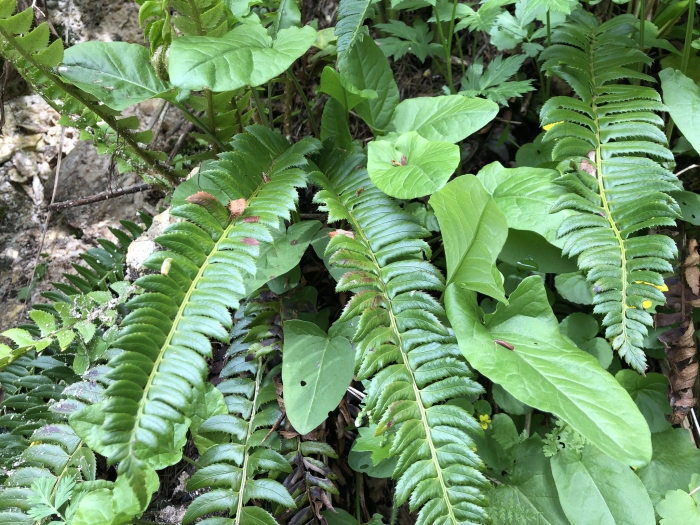Northern Hollyfern
(Polystichum lonchitis)
Northern Hollyfern (Polystichum lonchitis)
/
/

Jason Grant
CC BY 4.0
Image By:
Jason Grant
Recorded By:
Copyright:
CC BY 4.0
Copyright Notice:
Photo by: Jason Grant | License Type: CC BY 4.0 | License URL: http://creativecommons.org/licenses/by/4.0/ | Rights Holder: Jason Grant | Publisher: iNaturalist | Date Created: 2021-06-23T15:30:07-07:00 |

























Estimated Native Range
Summary
Polystichum lonchitis, commonly known as Northern Hollyfern, is a perennial herbaceous fern native to alpine and subalpine zones in the Northern Hemisphere, including Europe, Asia, and North America. It thrives in moist, shady, rocky mountain habitats such as the base of cliffs, on rock ledges, and among boulders. This fern is particularly adapted to cold, calcareous environments and is often found in crevices of limestone rocks. Northern Hollyfern typically produces a dense tuft of glossy, erect fronds that can reach up to 24 inches in length. The fronds are characterized by lance-shaped pinnae with spiny-toothed margins, resembling the leaves of a holly plant, hence the common name.
Northern Hollyfern is valued for its hardiness and unique, spiny foliage which adds texture to shade gardens. It is suitable for rock gardens, woodland plantings, and as a ground cover in shady areas. While it prefers moist conditions, it is relatively drought-tolerant once established. Gardeners should plant it in well-drained, alkaline soil and provide it with partial to full shade. It is a low-maintenance plant, but it may require protection from slugs and snails, which can damage the fronds. Due to its rarity in the British Isles, it is listed as a Northern Ireland Priority Species, indicating conservation concern.CC BY-SA 4.0
Northern Hollyfern is valued for its hardiness and unique, spiny foliage which adds texture to shade gardens. It is suitable for rock gardens, woodland plantings, and as a ground cover in shady areas. While it prefers moist conditions, it is relatively drought-tolerant once established. Gardeners should plant it in well-drained, alkaline soil and provide it with partial to full shade. It is a low-maintenance plant, but it may require protection from slugs and snails, which can damage the fronds. Due to its rarity in the British Isles, it is listed as a Northern Ireland Priority Species, indicating conservation concern.CC BY-SA 4.0
Plant Description
- Plant Type: Fern
- Height: 1-2.5 feet
- Width: 1-2 feet
- Growth Rate: Moderate
- Flower Color: N/A
- Flowering Season: Non-Flowering
- Leaf Retention: Evergreen
Growth Requirements
- Sun: Part Shade, Full Shade
- Water: Medium
- Drainage: Medium, Fast
Common Uses
Border Plant, Low Maintenance, Rock Garden
Natural Habitat
Native to alpine and subalpine zones in the Northern Hemisphere, thriving in moist, shady, calcareous rocky mountain habitats
Other Names
Common Names: Holly Fern, Prickly Holly Fern
Scientific Names: , Polystichum lonchitis, Aetopteron lonchitis, Aspidium aculeatum subsp. lonchitis, Aspidium asperum, Aspidium lonchitis, Dryopteris lonchitis, Hypopeltis lonchitis, Polypodium lonchitis, Polystichum asperum
GBIF Accepted Name: